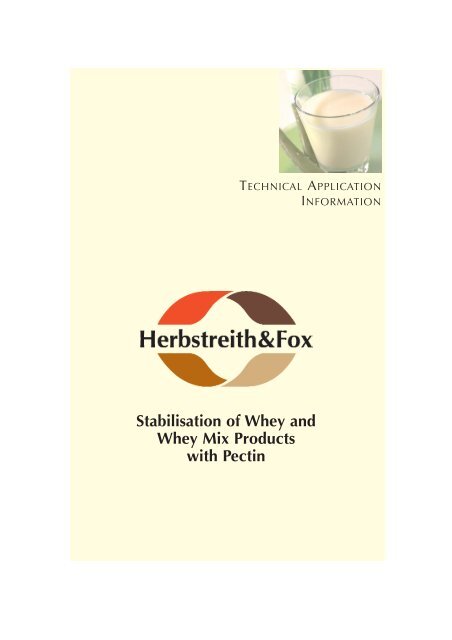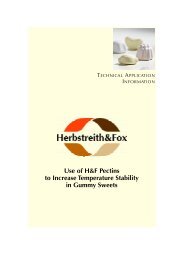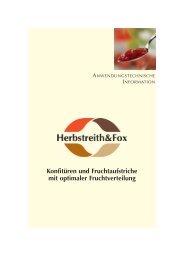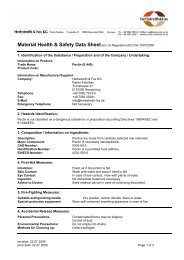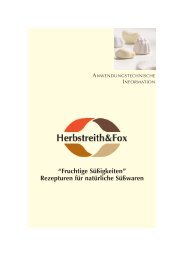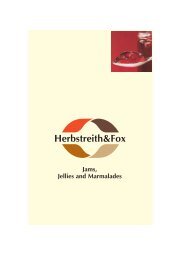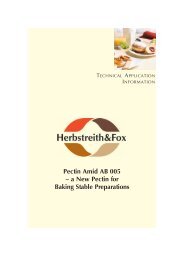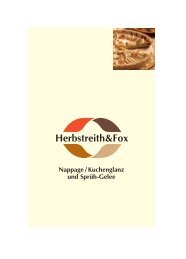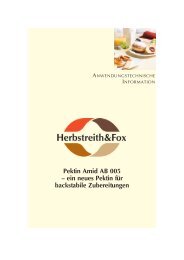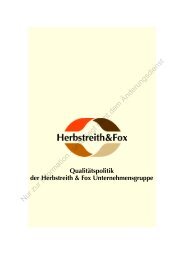AWT Stabillisation Of Whey - Herbstreith & Fox
AWT Stabillisation Of Whey - Herbstreith & Fox
AWT Stabillisation Of Whey - Herbstreith & Fox
You also want an ePaper? Increase the reach of your titles
YUMPU automatically turns print PDFs into web optimized ePapers that Google loves.
TECHNICAL APPLICATION<br />
Stabilisation of <strong>Whey</strong> and<br />
<strong>Whey</strong> Mix Products<br />
with Pectin<br />
INFORMATION
STABILISATION OF WHEY<br />
and <strong>Whey</strong> Mix Products<br />
The use of whey as remedy – whey cures for<br />
purification and weight reduction – has been<br />
described for generations.<br />
With its nutritionally-physiologically seen especially<br />
valuable contents whey was re-discoered<br />
for all those consumers who show a clear alimentary<br />
conscious behaviour in choosing food.<br />
However in the meantime, broad consumer<br />
groups are addressed regarding whey more and<br />
more as a synonym for a healthy inbetween<br />
meal, a tasty thirst quencher and a natural fitness<br />
drink.<br />
In the last two years whey drinks were the product<br />
group with the strongest growth within<br />
the “white line”.<br />
Besides the classic whey drinks there are increasingly<br />
whey mix products with fruit and/or further<br />
milk resp. yoghurt components. The whey<br />
proportion of the drinks is usually between 60%<br />
and 90%. Sweet whey as well as sour whey are<br />
used. As fruit components you can find juice,<br />
juice concentrate, fruit pulp or fruit preparations.<br />
The whey drinks have pH-values from 3.6 to<br />
4.2 and are usually – to achieve a longer shelf<br />
life – heat treated.<br />
<strong>Whey</strong> (milk serum) is a valuable by-product<br />
from rennet and cream cheese production milk<br />
is thickened with the addition of enzymes<br />
(rennet), acid or a combination of rennet and<br />
acid resp. by the activity of lactobacillus. The<br />
coagulated milk passes through a fortified syneresis<br />
of the protein gel in the further production<br />
process, in which whey is excreted.<br />
While the milk components protein (casein) and<br />
fat mainly form the cheese in the firm phase,<br />
the nutritionally-physiologically valuable whey<br />
proteins, the lactose, the minerals, a small<br />
amount milk fat as well as vitamins and trace<br />
elements remain in the whey.<br />
A distinction is made between sweet whey with<br />
a pH-value above 5.8 from rennet production<br />
and sour whey with a pH-value below 4.5 from<br />
sour-milk cheese production.<br />
HERBSTREITH & FOX Corporate Group • Turnstraße 37 • 75305 Neuenbürg/Württ. • Germany<br />
Phone: +49 7082 7913-0 • Fax: +49 7082 20281 • info@herbstreith-fox.de • www.herbstreith-fox.de<br />
2
With modern technologies it is possible to concentrate<br />
resp. isolate the single components of<br />
the whey (mainly the proteins) and to make<br />
them available in suitable form for the industry<br />
for the production of whey drinks. Besides whey<br />
as liquid particularly spray-dried whey powders,<br />
whey protein concentrates (protein content<br />
above 35%) as well as whey protein isolates<br />
(protein content above 90%) are used for the<br />
production of whey drinks.<br />
Their sensitivity towards heat is a critical property<br />
of whey proteins for the industrial whey<br />
processing and the production of whey drinks.<br />
<strong>Whey</strong> proteins are present in solved condition in<br />
sweet as well as in sour whey, however during<br />
heating they are denatured partially resp. completely<br />
– depending on the heating grade – and<br />
with that they become insoluble. This can lead<br />
to an undesired coagulation of the proteins and<br />
to sedimentation in the production of heattreated<br />
whey drinks.<br />
Pectin has a positive influence on the heat stability<br />
of whey proteins.<br />
Therefore pectin can be used for stabilisation of<br />
whey drinks being heat-treated to achieve a<br />
longer shelf life.<br />
Tests regarding stabilisation of whey drinks<br />
with pectin<br />
Subject to varying heating conditions whey<br />
drinks with and without pectin were produced<br />
to investigate the influence of pectin on the<br />
protein stability.<br />
Furthermore the influence of pH-value and ionic<br />
strength (addition of buffer substances) on the<br />
drink and the effect of a homogenisation step<br />
were analysed.<br />
The drinks were produced with whey powder<br />
resp. whey protein concentrate. The protein<br />
content of the whey drinks was between 0.2<br />
and 1.6% (the protein content of whey is about<br />
0.8%). The heat treatment was done at 60° C,<br />
70° C, 80° C and 90° C for 10 minutes. The drinks<br />
which were produced without pectin were already<br />
separated strongly at a heat treatment of<br />
60° C / 10 minutes (separation into two phases).<br />
With the addition of pectin all drinks – also<br />
those being heated up to 90° C – were stable.<br />
In all drinks a light sediment could be found,<br />
probably resulting from an already present partial<br />
protein denaturation in the raw material<br />
(whey, whey powder etc.).<br />
HERBSTREITH & FOX Corporate Group • Turnstraße 37 • 75305 Neuenbürg/Württ. • Germany<br />
Phone: +49 7082 7913-0 • Fax: +49 7082 20281 • info@herbstreith-fox.de • www.herbstreith-fox.de<br />
3
The influence of ionic strength on the heat stability<br />
of whey proteins under the addition of<br />
sodium citrate resp. a combination of pectin and<br />
sodium citrate was investigated. Sodium citrate<br />
solely had no influence on the whey proteins’<br />
stability – the drinks were instable. When increasing<br />
the ionic strength by addition of sodium<br />
citrate to drinks which were stabilised with pectin,<br />
a light amendment of the stability compared<br />
with the drinks being produced only with pectin,<br />
could be observed.<br />
Fig. 1: Sedimentation whey drinks (0.8% protein content, pH 3.8) in dependence<br />
from heating temperature<br />
pH-value and protein content of the whey drink<br />
are important influencing parameters for the<br />
pectin dosage required for stabilisation.<br />
The lower the pH-value (the test drinks had<br />
pH-values between pH 3.8 and 4.5), the higher<br />
is the necessary pectin dosage. For stabilisation<br />
of a whey drink with a protein content of 0.8%<br />
and a pH-value of 3.8, a dosage of 0.4 – 0.5%<br />
Furtheron a homogenisation step proved to be<br />
ameliorative regarding the stabilisation of the<br />
whey drinks.<br />
The chart shows the influence of pectin, sodium<br />
citrate and homogenisation on the stability of<br />
heat-treated whey drinks. The stability was<br />
assessed by determining the sediment proportion<br />
after centrifugation.<br />
Pectin Classic CM 203 is required (see chart).<br />
With increasing protein contents also higher<br />
pectin dosages have to be applied whereas<br />
drinks with very high whey protein contents<br />
cannot be stabilised at higher temperatures.<br />
HERBSTREITH & FOX Corporate Group • Turnstraße 37 • 75305 Neuenbürg/Württ. • Germany<br />
Phone: +49 7082 7913-0 • Fax: +49 7082 20281 • info@herbstreith-fox.de • www.herbstreith-fox.de<br />
4
Fig. 2: Stabilisation of whey drinks in dependence from pectin dosage<br />
The tests could prove the positive influence of<br />
pectin on the heat stability of whey products.<br />
For an economic and efficient stabilisation of<br />
whey drinks, also with a longer shelf life, all<br />
influencing factors mentioned have to be considered.<br />
In order to assess the behaviour of whey proteins<br />
also under industrial heating conditions,<br />
whey mix drinks (protein content 0.8%, pHvalue<br />
approx. 3.8, pectin dosage 0.25 resp. 0.5%<br />
Classic CM 203) were produced in technical scale<br />
and heated in a plate heat exchanger at 75° C,<br />
90° C and 105° C for 20s.<br />
Under these conditions which are more gentle<br />
for whey proteins also a partial denaturation –<br />
depending on the heating grade – takes place.<br />
This effect can be largely avoided or obviously<br />
minimised by the addition of pectin.<br />
In the whey drinks which were produced with<br />
pectin under industrial conditions no flocculating<br />
of the whey proteins could be observed.<br />
With sufficient pectin dosage stable products<br />
could be obtained up to a heating temperature<br />
of 105° C for 20s.<br />
Besides the stabilizing effect pectin can also be<br />
used to increase viscosity in whey drinks, i.e. for<br />
reaching a desired mouthfeel. By increasing the<br />
viscosity furtheron the sediment proportion<br />
related to the raw material which is usually<br />
observed in these drinks, can be decreased.<br />
The tests could prove the positive influence of<br />
pectin on the heat stability of whey protein under<br />
industrial heating conditions whereas the<br />
production of stable whey drinks depends on<br />
the particular technology (heating process, homogenisation)<br />
and the recipe parameters such<br />
as pH-value, protein content and ionic strength<br />
which influence the optimal pectin dosage.<br />
In consideration of all these parameters it is<br />
possible to produce pleasing heat-treated whey<br />
resp. whey mix products with pectin having a<br />
longer shelf life due to the heat treatment.<br />
This meets the re-quirements of all those consumers<br />
having chosen this product line for<br />
themselves as healthy, tasty drinks.<br />
HERBSTREITH & FOX Corporate Group • Turnstraße 37 • 75305 Neuenbürg/Württ. • Germany<br />
Phone: +49 7082 7913-0 • Fax: +49 7082 20281 • info@herbstreith-fox.de • www.herbstreith-fox.de<br />
5
<strong>Herbstreith</strong> & <strong>Fox</strong> KG Recipe<br />
<strong>Whey</strong> Fruit Drink<br />
Product Pectin Classic CM 203<br />
120g Pectin solution 2.5% (= 0.3%)<br />
30g Sweet whey powder<br />
70g Orange juice concentrate<br />
50g Sucrose<br />
1.25g Citric Acid<br />
730g Water<br />
Citric Acid solution (50%)<br />
to adjust pH-value<br />
Input: approx. 1000g<br />
pH-value: approx. 3.8 - 4.0<br />
• Dissolve whey powder in 470g water and<br />
leave to swell for 30 minutes.<br />
• Dissolve orange juice concentrate, sugar<br />
and citric acid in the remaining water.<br />
• Make pectin solution 2.5% (see Technical<br />
Application Information).<br />
• Stir pectin solution into the whey<br />
(Ultra Turrax).<br />
• Adjust pH-value to 3.8 - 4.0 if necessary.<br />
• Homogenise at 150 bar.<br />
• Pasteurise 70°C, 10min.<br />
RESEARCH & DEVELOPMENT<br />
HERBSTREITH & FOX CORPORATE GROUP<br />
22/06/2005<br />
HERBSTREITH & FOX Corporate Group • Turnstraße 37 • 75305 Neuenbürg/Württ. • Germany<br />
Phone: +49 7082 7913-0 • Fax: +49 7082 20281 • info@herbstreith-fox.de • www.herbstreith-fox.de<br />
6


